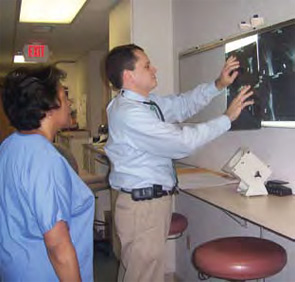Smith has found the reception to be very good at McIntosh Clinic. “Patients recognize that Dr. McMillan and I are a team and value the opinion and input that we are able to offer,” he says. Some of that reception has undoubtedly been due to the fact that waiting time was reduced once he came on board at the clinic.
SPAR Vice President Antonio (Tony) Giannelli, MsA, PA-C, who has been practicing rheumatology for the past 16 years, works three days at Associated Internal Medicine Specialists, a multispecialty practice with three rheumatologists in Battle Creek, Mich., and another two days a week for a solo practice, Lansing Rheumatology in East Lansing. He reports that “most of the time, patients feel very comfortable after the first encounter with the PA.” It can work well, he says, to have the PA gather baseline information from new patients, “as long as everybody feels comfortable and the communication is smooth between the rheumatologist and the PA. I think that’s the key to everything.”

Training Initiatives and Resources
Traditionally, most rheumatology PAs have acquired their training on the job. The opportunities are expanding for rheumatology PAs, but the training has come slowly, according to Dr. Hooker. The ACR and ARHP recently co-developed an online 19-module educational program on all aspects of rheumatologic care, from basic immunology to the musculoskeletal exam, to imaging, in specific adult and pediatric disease states. That course, the Advanced Rheumatology Course, can be accessed at www.rheumatology.org/education.
At the University of Texas Southwestern Medical Center in Dallas, Dr. Hooker and rheumatologist Salahuddin Kazi, MD, initiated a rheumatology fellowship for PAs in 2003, under a VA demonstration project that lasted four years.
In addition, SPAR leaders and other long-time rheumatology PAs are eager to attract more PAs in training to their specialty. For the last three years, Giannelli has done a rheumatology lecture series to PAs in training at Western Michigan University, where David Areaux, MPAS, PA-C, is assistant professor. In two 4-hour classes, he covers the basics of rheumatology to impart the enthusiasm that he has for his chosen field. Other colleagues (including Rick Pope, PA-C, from Connecticut and Linda Davis, PA-C, MHS, from Georgia) are embarking on the same mission in their regions, he reports. He has initiated collaborations with other PA training programs in Michigan to foster more interest in rheumatology, better prepare students for an aging population, and perhaps choose it as a postgraduate selection. “We call his lectures ‘Rheumatology 101,’” says Areaux. “Already a few students have indicated they want to do more rheumatology when they select an elective for their second year rotations, so he has definitely piqued their interest.” For more on PA training programs, visit www.rheumpas.org to watch a video on “Successful Collaboration on Education,” created by SPAR.

